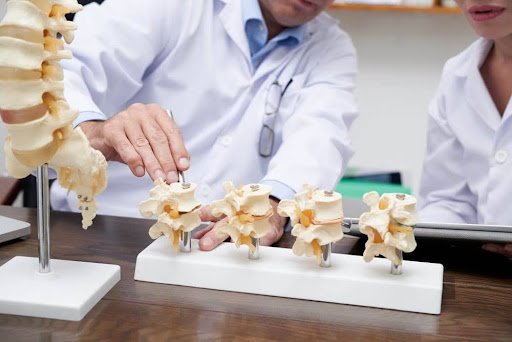Spinal decompression surgery becomes an option when other treatments don’t work. It’s a solution for people dealing with issues like herniated discs, spinal stenosis, or degenerative disc disease. In this blog, let’s break down spinal decompression surgery, understanding what it does, the different types, and the benefits it brings to those with spinal problems.
Understanding Spinal Decompression:
Spinal decompression is like giving your spine some breathing space. When your spinal cord or nerves feel squished due to problems like disc herniation or spinal stenosis, this surgery steps in. It’s especially helpful for relieving persistent leg pain and numbness caused by nerve pressure.
Types of Spinal Decompression Surgeries:
Laminectomy:
Think of it like creating more room for your nerves. A small part of a bone in your spine is removed to ease pressure. This is commonly done to treat spinal stenosis.
Discectomy:
This one is about fixing a bulging or herniated disc. They remove the troublesome part, and if they use a minimally invasive method (microdiscectomy), it means smaller cuts and less disturbance to your muscles.
Picture joining a couple of vertebrae to keep your spine steady. It might not directly decompress, but it often happens together with other procedures for added stability.
Artificial Disc Replacement:
It’s like swapping a worn-out disc with an artificial one. This keeps your spine moving naturally, which is a cool alternative to fusion.
Benefits of Spinal Decompression Surgery:
Pain Relief:
The big win here is saying goodbye to constant back or neck pain caused by squeezed nerves. Creating space in the spine helps reduce the pressure, easing the pain.
Improved Mobility:
With spinal decompression, you get to move around more freely. No more feeling stuck due to compressed spinal parts.
Enhanced Quality of Life:
Life gets better when pain decreases, and you can do your daily stuff more easily. That’s the perk of increased mobility and reduced discomfort.
Prevention of Neurological Dysfunction:
Addressing the main issue, like nerve compression, helps avoid or lessen nerve-related problems in the long run.
Who Does the Spinal Decompression Surgery?
A neurosurgeon or an orthopaedic surgeon can perform spine surgery. Many spine surgeons have specialized training in complex spine surgery.
In conclusion, spinal decompression surgery can be a game-changer for people struggling with spinal issues. But, it’s super important to talk to skilled spine surgeon who can understand your situation and recommend the best plan for you. As technology moves forward, spinal decompression surgeries keep getting better, offering hope for those seeking relief from spinal problems.
In addition to the comprehensive information provided, it’s worth noting that Dr. Vishal Bhasme, a skilled spine surgeon, offers specialized spine surgeries in Pune. His expertise in the field adds an extra layer of assurance for individuals considering spinal decompression surgery.















